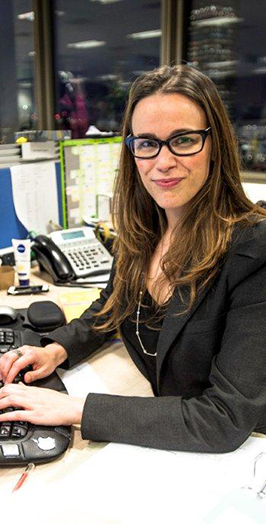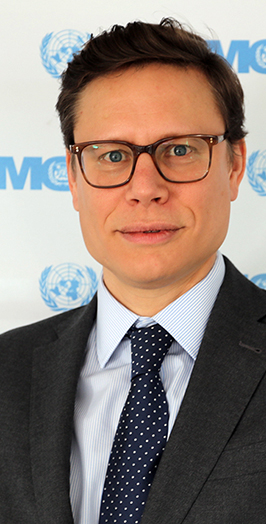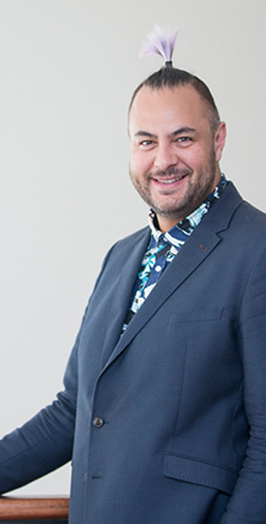What you can look forward to
Find out what our staff think about the various strengths and attractions of IMO, from our global impact and multi-cultural environment through to our efforts to curb climate change.
Natalia Laguna
External Relations Officer
For me, one of the best things about IMO is its multicultural nature. I work in a team of seven people with six different nationalities, each with different backgrounds, stories and perspectives. The variety of views keeps things fresh but also requires tolerance and diplomacy.
Diplomacy is often questioned but it’s like a common language – it helps us communicate more amicably and provides the space to hear lots of different views about global maritime issues and to find agreement.
As I’m involved in the organization of the World Maritime Day and its parallel event, which is hosted by a different country each year, such as Colombia and Poland, I also get to experience and learn a lot about different cultures, not as a tourist but more deeply as someone working closely with them, which I consider a privilege.
Roel Hoenders
Head of Climate Action and Clean Air Section
Like all transport sectors, shipping emits CO2 – about 2.2% of the world’s total CO2 emissions. That doesn’t seem much but it’s comparable to the emissions of a mid-sized country. Just as most countries have committed to reduce their national emissions of greenhouse gases (GHG), the global maritime industry has made its own commitments to cut its GHG emissions. Attributing emissions from international shipping to a specific country is difficult as these are emitted along a ship’s international voyage. That’s where IMO comes in as a UN specialized agency and the global regulator of tover 50.000 merchant ships worldwide, involving 174 States as well as other international organizations and NGO’s in its decision-making process.
IMO’s Initial Greenhouse Gas Strategy commits the shipping industry to reduce its ‘carbon intensity’ – the amount of CO2 emitted per tonne/mile – by 40% by 2030 compared to 2008, and to cut its total CO2 emissions by 50% by 2050. These are ambitious, but achievable, goals, for example by improving ships’ designs – their hulls, propellers and so on - and the use of renewable marine fuels. We are making significant progress towards those goals, but we still have to overcome regulatory and technical hurdles to adopt global decarbonization solutions that leave no country behind. This makes IMO such an interesting place to work.
Brendan Marshall
Senior Administrative Assistant, Technical Cooperation and Implementation Division
IMO highlighted the promotion of gender equality in 2019, when ‘Empowering Women in the Maritime Community’ was selected as the World Maritime Day theme. This promoted the work of the Women in Maritime programme, which was initiated in 1988. Since then, we have been intensifying our focus on the issue under the slogan - Training-Visibility-Recognition, because progress for women is progress for all – everyone thrives, including communities and economies, if we have gender equality.
Initiatives have ranged from giving women access to scholarships and establishing regional networks so that women in the sector can share experiences, learn from each other and mentor each other. IMO’s International Law Institute was also the first UN-associated body to reserve 50% of its places for women.
Women only make up a small portion of seafarers, about 2%, but we’ve been making progress in encouraging governments to enable women to develop and advance careers in the sector and to rise to senior positions. An important recent development, in 2019, was when the IMO Assembly adopted a resolution urging further firm action in coming years to advance gender equality throughout the maritime sector and reach a barrier-free environment. . Moves are also underway to address diversity and representation issues, including gender, LGBTI, disability and intersectionality. Internally, we’ve recently established a cross-divisional Gender and Diversity Group to establish an institutional framework within IMO with a view to creating an enabling work environment that embraces equality, diversity and reduces bias for all IMO staff.
Lionel Shen
Computer Assisted Translation and Terminology Specialist
The maritime sector is constantly evolving, with digitalisation presenting some great opportunities for innovation, for instance through autonomous shipping, blockchain technology and the ‘Internet of Things’ (IoT). New technology is not being used to replace people but to assist them, so they can take on smarter, higher-level roles, as we’ve done for thousands of years.
IMO has innovated in lots of areas, especially in protecting the environment, for example in reducing greenhouse gases and sulphur emissions, as well as in promoting women in shipping. As we provide the legal and regulatory framework for these advances, we need to take into account both the social and economic impacts, which creates both challenges and opportunities to make a real, positive difference.
The work I am doing currently focuses on computational linguistics, computer science and, specifically, Neural Machine Translation (NMT). Specifically, the eLUNa & UNTERM (CATT) systems deliver a suite of web-based linguistic tools to offer in-house and contract staff documents, terminology, references, computer-assisted translation and machine translation solutions. This will enable IMO to integrate all its multilingual documents into a single, intelligent and "deep learning" system that will help translators to translate more accurately, consistently, and quickly.
Delegates and technical experts can also use linguistic and terminological resources (Semantic Web, Thesaurus, Ontology, Business intelligence, etc.) for the drafting of their documents. Amongst other benefits, this will help maritime regulations be implemented more consistently as many of the documents we translate have legal implications, and every legal domain is fundamentally a language domain.



